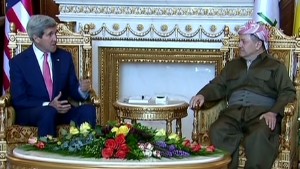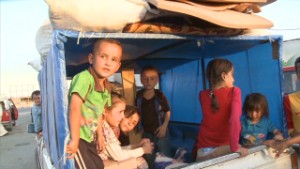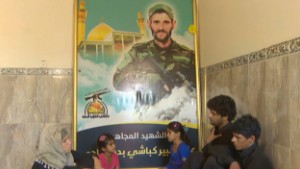Could ISIS retaliate against the West?可以ISIS報復西方?
- European militants who have traveled to Syria could go back home and launch attacks
- So far, militants in Iraq and Syria haven't seen attacking the West as a priority
- But officials also fear the conflict could create new terror ties, bomb technology, lone wolves
(CNN) -- The U.S. air strikes carried out Friday against ISIS are likely to have one unintended consequence: immediately increase the terrorist threat in Europe and the United States, Western counter-terrorism officials tell CNN.
Within hours of U.S. military jets and drones conducting a strike on ISIS artillery that had been used against Kurdish forces defending Irbil, ISIS supporters called for retaliatory attacks against the United States.
"It is a clear message that the war is against Islam and the mujahideen. The mujahideen must strive and seek to execute proactive operations in their own home, America, to discipline America and its criminal soldiers," Abu al-Ayna al-Khorasani, an administrator of Shumukh al-Islam, the top-tier forum for ISIS propaganda, wrote on his account Friday, according to a translation by the SITE Intelligence group.
Other ISIS supporters railed against the United States using the Twitter handle #AmessagefromISIStoUS, posting images of the wreckage of the twin towers. "Don't forget 11 Sept .. Maybe US citizens want more like that," one extremist tweeted. In June after ISIS captured Mosul, its supporters had warned against strikes in a Twitter campaign #CalamityWillBefallUS.





Here are three ways ISIS and its supporters could retaliate for U.S. military action against its fighters:
1. ISIS could unleash a crash program to attack the West
The nightmare scenario is that ISIS leaders initiate a crash program to launch attacks in the West. They are well-positioned to unleash such carnage if they choose.
ISIS, which calls itself the Islamic State but formerly was known as the Islamic State in Iraq and Syria, is thought to have tens of millions of dollars in cash reserves and it operates training camps on a scale last seen in Taliban-run Afghanistan. The 9/11 operation, by point of reference, cost $500,000.
European officials tell CNN up to 1,000 European extremists are believed to have joined ISIS. Dozens of Americans are probably fighting with the group, too. This gives ISIS the opportunity to train them and send them back home to launch attacks.
These European fighters also could pose a threat to the United States because many Europeans do not need a visa to enter the U.S.
There also are fears these Western fighters might be equipped with sophisticated devices that could evade airport security. Early this year, U.S. officials became worried that some AQAP bomb-makers trained by master-bombmaker Ibrahim al Asiri may have traveled to Syria.
This combination of threats was described by U.S. Attorney General Eric Holder as "more frightening than anything I think I've seen as attorney general," in an interview with ABC News several weeks ago.
So far, though, ISIS has not seen attacking the West as anything near a priority.
Its focus instead has been on expanding the territory it controls in Syria and Iraq.
The political turmoil brought about by the Arab Spring has made the ultimate dream of global jihadists -- the adoption of their kind of Islamic rule across the Arab world -- seem tantalizingly close. Attacking the West, which for al Qaeda leaders was always a means to this end, has become something of a sideshow.
It is possible that the limited aerial campaign initiated by U.S. President Barack Obama will not see a significant switch of focus from ISIS towards attacking the West. The White House's stated objectives do not include degrading the group.
ISIS -- previously known as al Qaeda in Iraq -- has never prioritized targeting Western soil, instead preferring to focus on fighting "infidels" at home.
In the decade since the Jordanian terrorist Abu Musab al-Zarqawi created the group, it has not been directly behind any plot on Western soil, even during the years the United States military engaged it in intense counter-insurgency operations across Iraq.
By contrast, in the decade after the September 11 terrorist attacks, al Qaeda operatives in Pakistani tribal areas provided wave after wave of Western recruits training on how to make bombs out of chemicals and components readily available in home-improvement and beauty-supply stores in the West.
To date, only one suspected ISIS recruit who has returned to Europe is alleged to have built such a device.
In February, French police arrested a man they identified as Ibrahim B., a 23-year-old French-Algerian, and retrieved three soda cans filled with nearly a kilogram (about two pounds) of the high explosive TATP from his Cannes apartment. French police suspect that in the 18 months he fought in Syria, he learned how to make TATP, an unstable and difficult-to-transport high explosive used to build detonators in multiple al Qaeda plots against the West.
It is not clear whether ISIS signed off on his alleged plot.
While some Western recruits are taught how to make improvised explosive devices in Syria, there is little indication yet that the group has created a training program tailored to attacking the West. The worry is that that could change. After a decade of insurgency in Iraq, no other group has more expertise in making IEDs.



2. Returned fighters could take matters into their own hands
The most immediate threat to the West comes from hundreds of extremists who have returned home after fighting with terrorist groups in Syria. While little evidence has emerged so far that ISIS has directed them to launch attacks, their urban warfare skills would make them especially dangerous.
The first terrorist attack on Western soil linked to Syria probably followed this trajectory. Mehdi Nemmouche, a French-Algerian who spent a year in Syria and was recruited into ISIS, has been charged with gunning down four people at a Jewish museum in Brussels, Belgium, in May. ISIS itself did not claim responsibility for the attack, suggesting to investigators that Nemmouche planned the attack himself.
Among Western countries Europe has by far the greatest number of returnees.
"The threat of attacks has never been greater -- not at the time of 9/11, not after the war in Iraq -- never," a European counterterrorism official told CNN in June. He envisaged a flood of small-scale but effective and chilling attacks similar to the Brussels shooting.
European counterterrorism officials are worried the gains made by ISIS in Iraq will lead to a surge of travel to the region. In identifying who has traveled, they are often playing catchup.
"In most cases, we know within two weeks a guy has gone to Syria. But 10%-15% of the time, it can be several months before we figure it out. Inevitably, there will be some we have no idea about," one official told CNN.
But even those they know about are difficult to track. Nemmouche was on a watch list when he returned to Europe. European officials tell CNN it is impossible, because of the cost, to conduct 24-hour surveillance on any but a small fraction of people who have returned from Syria.
3. 'Lone wolves' could lash out
The Boston Marathon bombings illustrated the danger posed by extremists learning bomb-making skills over the Internet without having to travel to jihadist encampments overseas.
European officials say anger about events in Syria and Iraq and excitement about the gains made by ISIS have spiked radicalization to unprecedented levels across the continent.
Though the animus is not directed as squarely against the West as it was during the Iraq war, ISIS' viscerally anti-Western ideology is attracting a growing following in extremist circles in Europe. It matters little that European countries are not currently involved in air strikes: ISIS supporters believe all Western countries are working together to attack Islam.
The Costs of inaction
The likely increased terrorist threat in the West that will arise in the coming weeks and months from U.S. air strikes in Iraq should be weighed against the risks of letting ISIS grow unchecked.
If ISIS is able to consolidate its territorial gains, it could set up training camps to rival any run by al Qaeda in Afghanistan before 9/11. Though its focus may be in Iraq and Syria for now, its viscerally anti-Western ideology means it would be foolish to discount it as a major potential future threat.
Though the unfolding humanitarian crisis in Iraq may have left the Obama administration little choice but to act, the concern is the limited US aerial campaign has now stirred the hornet's nest without doing anything to decisively degrade ISIS.
And there could be one other unintended consequence. A rally-round-the-flag effect may now strengthen the ISIS position in the global jihadist movement, leading to even higher levels of fundraising and recruitment.
In recent months the group has faced fierce criticism from al Qaeda and others for its declaration of an Islamic caliphate and its brutal methods. But with the budding Islamic State now being bombarded by the "Crusaders," such criticisms may fade, at least for a time.
可以ISIS報復西方?
由保羅·克魯克香克,美國有線電視新聞網
2014年8月9日 - 更新1910 GMT(0310 HKT)
您的視頻將開始瞬間。
新聞提要
誰曾前往歐洲的敘利亞武裝分子可能會回家,發動攻擊
到目前為止,在伊拉克和敘利亞的武裝分子還沒有看到攻擊西方作為一個優先事項
但官員也擔心衝突可能會創造新的恐怖關係,炸彈的技術,孤獨的狼
(CNN) -美國空襲進行了五對ISIS可能有一個意想不到的結果:立即增加在歐洲和美國的恐怖威脅,西方反恐官員告訴美國有線電視新聞網。
在美國時間軍用飛機和無人駕駛飛機進行有關的ISIS砲兵罷工已被用來對付庫爾德人的力量保衛埃爾比勒,ISIS的支持者要求對美國的報復性襲擊。
“這是一個明確的信息,即戰爭是反對伊斯蘭教和聖戰的聖戰者必須努力,並尋求在自己的主場,美國執行積極的行動,以約束美國及其犯罪的士兵,”阿布 - Ayna AL-Khorasani, Shumukh·伊斯蘭的頂級論壇ISIS宣傳的管理員,寫了他的賬戶週五,根據翻譯的網站情報小組。
其他ISIS的支持者抨擊美國利用Twitter的處理#AmessagefromISIStoUS,張貼雙塔的飛機殘骸的照片。“別忘了9月11日..也許美國公民想要更多這樣的,”一個極端啾啾。在六月的ISIS後拍攝的摩蘇爾,其支持者警告不要在Twitter的運動#CalamityWillBefallUS罷工。
庫爾德斯坦的重要性 加拿大聖戰的視頻新兵ISIS 停止接下來的國內恐怖襲擊 難民的所有風險逃避ISIS
組圖:伊拉克兵臨城下 組圖:伊拉克兵臨城下
這裡有三種方式ISIS和它的支持者可能會報復打擊的戰鬥機美軍的行動:
1, ISIS可能引發崩潰的程序來攻擊西方
噩夢般的情況是,ISIS領導人發起了應急計劃推出在西方的攻擊。他們很好地發揮這樣的大屠殺,如果他們選擇。
ISIS,它自稱為伊斯蘭國家,但以前被稱為伊斯蘭國家在伊拉克和敘利亞,被認為有美元的數以千萬計的現金儲備,它的運作訓練營的規模最後一次出現在塔利班控制阿富汗的運行。在9月11日的行動中,參照點,花費50萬美元。
歐洲官員告訴美國有線電視新聞網高達1000歐洲極端分子據信已加入ISIS。美國人幾十很可能跟團戰了。這給了ISIS的機會,培養他們,送他們回家發動襲擊。
這些歐洲戰機也可能對美國構成威脅,因為很多歐洲人並不需要簽證進入美國
也有一些擔心這些西方戰機可能配備,可以逃避機場安檢複雜的設備。今年年初,美國官員開始擔心,經過訓練,通過主bombmaker易卜拉欣Asiri一些阿拉伯半島基地組織炸彈製造商可能已經前往敘利亞。
的威脅,這種組合是由美國司法部長埃里克·霍爾德在美國廣播公司的採訪幾個星期前被描述為“比什麼都重要,我想我已經看到了當檢察長更可怕的是,”。
到目前為止,雖然ISIS還沒有看到攻擊西方作為近一個優先事項什麼。
它的重點,而不是一直在擴大其在敘利亞和伊拉克控制的領土。
在阿拉伯之春所帶來的政治風暴使全球聖戰者的終極夢想 - 通過自己的那種整個阿拉伯世界的伊斯蘭統治的 - 看起來誘人接近。攻擊西方,這對於基地組織的領導人總是一種手段,為此,已經成為一種雜耍的。
這可能是由美國總統奧巴馬發起了有限的空中戰役將看不到重點從ISISà顯著開關對攻擊西方。白宮的既定目標不包括降解組。
ISIS - 以前被稱為基地組織在伊拉克的 - 從來沒有優先針對西方的土壤,而不是寧願專注於格鬥家“異教徒”。
地圖:哪裡是ISIS的?
自從約旦恐怖分子扎卡維扎卡維創建的組的十年裡,它並沒有直接被落後於西方土壤的任何情節,甚至在美國軍隊從事它在伊拉克各地激烈的反叛亂行動的十年。
與此相反,在9月11日恐怖襲擊後的十年中,基地組織成員在巴基斯坦部落地區提供的一波又一波西方的新兵如何製造炸彈出化學物質和成分的家裝和美容用品商店一應俱全的培訓西方。
到目前為止,誰也回到了歐洲唯一一個被懷疑的ISIS招被指建成這樣的裝置。
今年二月,法國警方拘捕一名男子,他們認定為易卜拉欣二,一個23歲的法國,阿爾及利亞和檢索3汽水罐充滿了他的公寓,戛納電影節高能炸藥TATP將近一公斤(大約兩磅)。法國警方懷疑,在18個月內,他轉戰敘利亞,他學會了如何使TATP,不穩定和難以運輸用於建立多個基地組織陰謀反對西方引爆高能炸藥。
目前尚不清楚是否ISIS在他的陰謀簽了字。
儘管一些西方新兵教導如何在敘利亞簡易爆炸裝置,幾乎沒有跡象但該集團創造了適合攻擊西方的培訓計劃。憂的是可能會改變。十年的叛亂伊拉克後,沒有其他組在做簡易爆炸裝置更多的專業知識。
伊拉克戰爭產生奇怪的聯盟 伊拉克家庭計算的ISIS的衝突成本
組圖:敘利亞內戰在2014年 組圖:敘利亞內戰在2014年
2, 返回的戰士可以採取事態掌握在自己手中
最直接的威脅,西方來源於上百個極端分子在敘利亞的恐怖組織的戰鬥後,誰已返回家園。雖然沒有證據表明已出現得很遠,ISIS已經指示他們發動攻擊,他們的城戰技能,會使他們尤其危險。
西方土與敘利亞第一恐怖襲擊可能遵循這一軌跡。邁赫迪Nemmouche,法國,阿爾及利亞誰花了一年時間在敘利亞,被招入的ISIS,已被控以擊倒四個人在布魯塞爾,比利時猶太博物館,五月。ISIS本身並沒有聲稱對襲擊事件負責,這給調查人員,Nemmouche計劃攻擊自己。
在西方歐洲擁有由海歸迄今為止最大數量。
“攻擊的威脅從未如此巨大 - 而不是在911的時候,而不是在伊拉克戰爭結束後 - 永遠,”歐洲反恐官員告訴CNN六月。他設想海量的小規模,但類似於布魯塞爾拍攝效果和令人不寒而栗的攻擊。
歐洲反恐官員擔心由Isis在伊拉克將導致旅行到該地區激增的漲勢。在確定誰的足跡,他們經常玩追趕。
“在大多數情況下,我們知道兩週的傢伙已經向敘利亞之內,但時間的10%-15%,也可以是數個月,我們弄清楚之前,不可避免地,會有一些我們不知道什麼, “一位官員告訴CNN。
但即使是那些他們所知道的是難以跟踪。Nemmouche是一個觀察名單上的時候,他回到了歐洲。歐洲官員告訴美國有線電視新聞網則是因為成本不可能的,要進行24小時監控任何但是誰從敘利亞返回的人的一小部分。
3, “ 孤獨的狼”可以罵
波士頓馬拉松爆炸事件表示極端分子學習製造炸彈的技能通過互聯網所帶來的危險,而不必前往聖戰者營地海外。
歐洲官員說,憤怒有關在敘利亞和伊拉克的活動,並興奮由Isis所取得的成果已經上調激進化對整個非洲大陸前所未有的水平。
雖然敵意並非針對為正視反對西方,因為它是在伊拉克戰爭中,ISIS的“發自內心的反西方意識形態正吸引著越來越繼在歐洲極端主義的圈子。這無關緊要,歐洲國家目前不參與空襲:ISIS的支持者認為所有西方國家正聯手攻擊伊斯蘭教。
成本í naction
將會出現在從美國空襲伊拉克今後幾週和幾個月可能增加恐怖主義威脅西方應權衡讓ISIS的成長選中的風險。
如果ISIS是能夠鞏固其領土的收益,它可以建立訓練營9月11日之前,對手基地組織在阿富汗的任何運行。雖然它的重點可能是在伊拉克和敘利亞就目前而言,其發自內心的反西方意識形態意味著這將是愚蠢的打折它作為一個主要的潛在未來的威脅。
雖然在伊拉克展開的人道主義危機可能已經離開了奧巴馬政府別無選擇,只能採取行動,值得關注的是限制美國空中運動現在已經攪動了馬蜂窩沒有做任何事情要果斷降低ISIS。
還有可能是另外一個意想不到的後果。集會,二十四旗的效果現在可以加強在全球聖戰運動ISIS的位置,從而導致更高水平的籌款和招募。
近幾個月來該集團面臨激烈的批評來自基地組織和其他為它聲明的伊斯蘭哈里發及其殘暴的手段。但隨著萌芽伊斯蘭國正在轟炸的“十字軍”,這樣的批評可能會消失,至少在一段時間。



 留言列表
留言列表
 {{ article.title }}
{{ article.title }}

